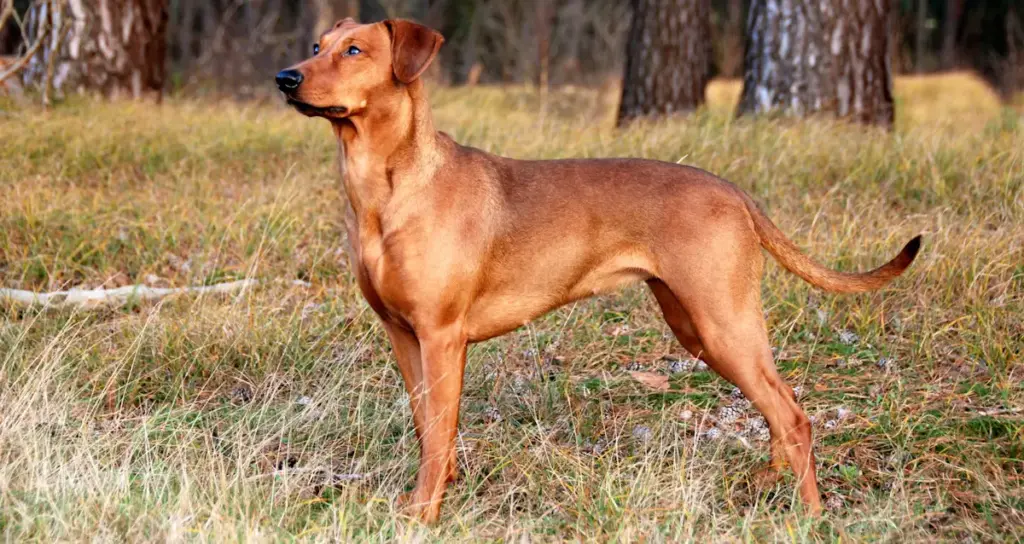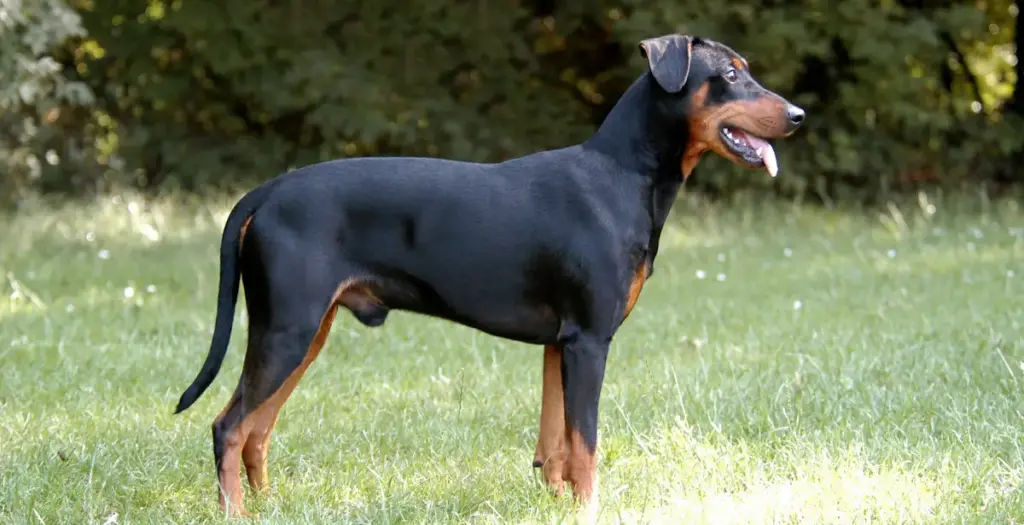As you wind your gramophone for an evening of jazz, consider a companion whose roots are as classic as your music taste—the German Pinscher. This breed, often mistaken for its larger cousin, the Doberman, is a well-kept secret among dog enthusiasts.
You’ve likely seen them, with their sleek coats and poised stance, and perhaps you’ve pondered what it’s like to have such a versatile creature as part of your family. Known for their intelligence and spirited character, German Pinschers can adapt to various roles, from vigilant watchdogs to affectionate household pets.
As you weigh the pros and cons of welcoming a German Pinscher into your home, you may find yourself intrigued by their storied history and the nuanced care they require. Before you decide, it’s essential to understand what sets this breed apart—information that might tip the scales for you.
German Pinscher: Traits, Temperament, and Care Guide
With its spirited personality and astute intelligence, the German Pinscher demands early socialization and consistent training to ensure it develops into a well-mannered companion. Their temperament is vivacious and clever, but without proper guidance, they may not integrate well with other pets.
Employing positive training techniques that match their lively nature is essential. Daily exercise isn’t just a recommendation; it’s a requirement for this energetic breed, involving one to two hours to keep them mentally and physically satisfied. Understand that while quick to learn, they thrive on structure and clear expectations.
As you bond through training and exercise, you’re not just raising a dog but nurturing a loyal family member.
Exploring the Characteristics of the German Pinscher
When exploring the characteristics of the German Pinscher, you’ll immediately notice their robust yet sleek physique, reflecting the breed’s dynamic agility and strength. As a medium-sized dog, the German Pinscher exhibits unique characteristics that testify to their versatility. Their lively and intelligent nature makes them quick learners, but their strong prey drive means you must be mindful of smaller pets. Training isn’t just beneficial; it’s necessary to channel their energy positively.
| Aspect | Detail |
|---|---|
| Size | Medium-sized |
| Body | Muscular and well-built |
| Learning | Quick and responsive |
| Prey Drive | Noticeably strong |
| Grooming | Bonding opportunity |
German Pinscher: A Comprehensive Profile and Guide
Understanding the German Pinscher goes beyond appreciating its sleek coat and spirited demeanor; you’re embracing a companion with a distinct personality that thrives with proper care. By learning about their specific dietary needs, health issues, and grooming rituals, you’re equipping yourself to provide the best life for your German Pinscher.
Effective training techniques won’t only harness their natural intelligence but also strengthen the unique bond you share with your energetic and loyal friend.
Everything You Need to Know
Delving into the German Pinscher’s world, you’ll discover a breed marked by its intelligence, versatility, and spirited nature. Prospective owners must grasp the nuances of their care and communication. The German Pinscher dog is more than just a pet; it’s a companion that fits seamlessly into the lives of those they love.
- Breed Overview
- Intelligent and eager to learn
- Versatile in work and play
- Spirited and confident demeanor
- Health and Care
- Vigilance against common health concerns
- Maintaining their smooth coat with regular grooming
- Mitigating separation anxiety with proper training
- Bonding Through Grooming
- Grooming as a way to strengthen your bond
- Insight into their personality and well-being
- An opportunity for health checks and comfort
Embrace the journey with your German Pinscher, ensuring a fulfilling life for both of you.
Discovering the Temperament
Beneath their sleek exterior, German Pinschers reveal a vibrant and assertive temperament that thrives with firm, consistent training and genuine companionship.
Understanding their need for strong leadership is crucial as you welcome this breed into your life. They’re not just spirited; they’re loyal and affectionately bond with their families, seeking to belong just as you do.
Their playful nature brings life to active homes. However, without proper guidance and socialization, behavioral issues such as separation anxiety and aggression can surface. Addressing these with firm and consistent training are essential.
Employing positive reinforcement will curb unwanted behaviors and foster a trusting and respectful relationship. Remember, patience and empathy are the keys to unlocking the full potential of your German Pinscher’s temperament.

German Pinscher: Is It a Good Fit for Families?
Are you considering adding a German Pinscher to your family dynamic? Given their boundless energy and sharp intellect, they’re a match for households that thrive on activity and engagement.
However, their assertive nature and need for consistent training mean they’re best suited for families with older children or those with dog experience, ensuring a harmonious integration into the family unit.
Assessing German Pinscher’s Compatibility with Families and Kids
When evaluating the German Pinscher’s suitability for family life, it’s essential to consider their energetic nature and need for consistent training to ensure they integrate well with children and adults.
- Energetic Nature:
- German Pinschers have high energy levels that require outlets.
- Appropriate for families with an active lifestyle.
- Without exercise, they may become restless and challenging.
- Consistent Training:
- A well-behaved German Pinscher is a product of patient and consistent training.
- Helps prevent potential dominance or aggression issues.
- Reinforces positive behaviors, aiding in a harmonious family environment.
- Health Issues:
- Understanding potential health issues is crucial for long-term planning.
- Regular vet check-ups ensure a healthy, happy dog.
- Awareness of breed-specific conditions fosters preventive care.
German Pinscher Flexibility
German Pinschers demonstrate remarkable adaptability, comfortably acclimating to the bustling city life and serene country living, provided they receive the necessary exercise and mental engagement.
This versatile breed, medium-sized yet full of energy, requires regular activity and intellectual challenges to stay happy and healthy.
As an owner, you’ll find their intelligence and high spirits demand consistent training, paired with a loving touch to foster a deep bond.
German Pinscher Training Essentials
As you train your German Pinscher, it’s crucial to recognize their spirited temperament and tailor your approach to meet their unique needs. Effective training strategies hinge on clear communication and establishing a mutual bond, which enhances obedience and deepens your connection.
Starting early with socialization and obedience training sets the stage for a disciplined and well-adjusted companion, paving the way for a harmonious relationship.
Effective Training Strategies
To maximize your German Pinscher’s potential, it’s crucial to employ training strategies that leverage their high intelligence and innate instincts. By understanding their temperament and needs, you can cultivate a strong bond, ensuring they become a beloved companion. Grooming, for example, is more than a maintenance task; it’s a trust-building exercise that reinforces your connection.
Effective communication is key to addressing any health problems and preventing behavioral issues. Here’s a concise guide to help you connect and train your German Pinscher effectively:
| Training Focus | Tips for Success |
|---|---|
| Bonding & Communication | Use consistent commands and rewards to enhance understanding. |
| Health & Behavior | Regular check-ups and tailored exercises prevent issues. |
| Grooming as Bonding | Integrate grooming into the routine to build trust. |
Exercise and Grooming Needs
Ensuring your German Pinscher gets at least an hour or two of daily exercise is vital for their physical and mental well-being. As a medium-sized breed with a penchant for activity, regular brisk walks or jogs are essential to burn off their high energy levels and maintain their health. Each stride strengthens your bond, fostering a sense of belonging and trust.
Regarding grooming, your Pinscher’s short coat, which lies close to the body, requires minimal effort—just a weekly brushing to manage loose hair and occasional baths. This routine keeps their coat gleaming and serves as a preventive measure against potential health issues.

Health Considerations
As you consider welcoming a German Pinscher into your life, you must be aware of the common health issues they may face, including their potential impact on the dog’s lifespan.
While they’re a robust breed, nurturing their health with proper nutrition and regular vet check-ups is essential in mitigating risks like hip dysplasia or heart disease.
Understanding these health considerations is key to ensuring your companion’s long, happy life.
Common Health Issues and Lifespan
While German Pinschers are generally robust dogs, they can inherit or develop certain health conditions, so it’s vital for you as an owner to understand these potential issues and their impact on your dog’s lifespan. Typically, a well-cared-for German Pinscher can live anywhere between 12 to 14 years.
As an older breed, German Pinschers may face common health issues and lifespan concerns like hip and elbow dysplasia, PRA, and Von Willebrand’s disease.
Ensuring their overall health and well-being hinges on regular exercise, mental stimulation, and proactive veterinary care, including routine health screenings to manage heart disease.
By maintaining a close relationship with your vet and staying informed about health risks, you’re contributing to the vitality and longevity of your pet.
Alternatives for German Pinscher: Energetic and Loyal Medium-Sized Dogs
If you’re captivated by the German Pinscher’s blend of energy and loyalty, consider these medium-sized breeds known for their vitality and devotion.
| Similar Dogs | Short Description |
|---|---|
| Doberman Pinscher | Known for its sleek build and protective instincts, ideal for families and guarding. |
| Rottweiler | A robust breed well-known for its loyalty and strength. |
| Boxer | Energetic and playful, great for families and known for its protective nature. |
| Miniature Pinscher | Small but assertive, known for its energy and strong character. |
| Belgian Malinois | Highly trainable and active, often used in demanding roles like police work. |
Is German Pinscher the Right Dog for You?
Considering a German Pinscher as your next canine companion requires understanding that their high-energy nature demands a committed and active lifestyle. Unlike their relative, the Doberman Pinscher, the German Pinscher is a medium-sized breed recognized by the American Kennel Club for its versatility and spirited temperament. They require a lot of time for exercise and training to channel their boundless energy positively.
If you’re someone who cherishes an active daily routine and thrives on providing structured guidance, this breed could seamlessly fit into your life. However, their assertive traits may challenge first-time owners. They need early socialization and a nurturing yet firm hand.
Embrace the journey of raising a German Pinscher, and you’ll gain a fiercely loyal and affectionate family member.
Frequently Asked Questions
What Two Breeds Make a German Pinscher?
You’re exploring the German Pinscher’s ancestry, where breed evolution history reveals original Pinscher types were shaped by crossbreeding influences, specifically the German Bibarhund and Tanner breeds. You’re connecting with a proud heritage.
Do German Pinschers Bark a Lot?
You’ll find that German Pinschers bark quite a bit, responding to barking triggers. However, with behavioral management, quiet commands, and understanding noise levels, you can cultivate a more serene environment for your loyal companion.
Are German Pinscher Easy to Train?
German Pinschers are intelligent companions who thrive with consistent discipline and positive reinforcement despite some training challenges. They need a firm, understanding hand to nurture their potential.
Do German Pinschers Cuddle?
Yes, German Pinschers often cuddle as part of their affectionate behaviors. Their Pinscher personality fosters bonding activities, and they’re great exercise companions, balancing activity with moments of closeness for a sense of belonging.
Conclusion
In conclusion, the German Pinscher is a vibrant and loyal companion that may perfectly match you. Their spirited and adaptable temperament makes them seamlessly fit into your family’s rhythm. However, it is important to remember that training and exercise are non-negotiables for this breed’s happiness. So, before deciding, consider if you are ready to commit. If you are, this intelligent and affectionate protector will reward you with unwavering loyalty and countless adventures by your side.
